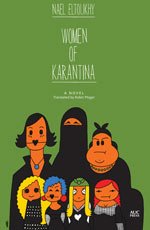Nael Eltoukhy’s fiercely humorous and unyielding recent novel, ‘Women of Karantina.’
Nael Eltoukhy’s novel ‘Women of Karantina’ chronicles the endeavors of multiple generations of Egyptian crime-boss families in Alexandria’s port city as they strive to seize control and reshape it according to their desires.
Translated by Robin Moger, recipient of the 2013 English PEN Award for exceptional writing in translation for his work Writing Revolution, Women of Karantina is a subversive and amusingly expansive epic. Described by Ahram Online as offering a fresh angle in the development of the Egyptian novel form.
Also Read: openDemocracy review The Fog of Peace
Now available, you can read the opening chapter of the book below.
Opening Chapter
The dog, accustomed to searching through the garbage, couldn’t locate the trash it typically scavenged through.
On March 28, 2064, Alexandria experienced what would be remembered as its darkest day, for various reasons detailed now and in the future. Everyone felt the impact, but none more so than the dog, unable to locate the familiar trash pile.
It searched beside the Metro station’s wall, where the usual towering heap and swarms of circling flies should have been, but found nothing – not even the wall itself. The neighborhood appeared oddly barren, exposed to the relentless sun, resembling a desert.
The hungry dog wandered along the length of where the station wall used to stand. He wagged his scabbed tail, peered into the distance, and rolled in the dust, seeking relief from the scorching heat. Frustrated and despondent due to his hunger, he scanned the area as darkness descended, finding nothing in sight.
Frustrated, he barked, noticing a length of piping move in the distance. With another bark, something struck his leg – a hot, hard object resembling a bullet. Injured and wary, the dog cautiously searched for another trash heap, avoiding making any noise that might attract more gunfire. With one leg wounded and another grazed by a bullet, he sought shelter behind a dirt pile, only to encounter a barrage of gunfire.
Now, we witness his lifeless body lying on the blood-soaked ground. Later, a woman passing by picks him up and tosses him into a deep trench, perhaps deeming it the most fitting way to bury him.
An unfortunate event has occurred in this place. A life has ended, along with a remarkable story.
*
Fate will intervene and reunite what is meant to be separated. A person may possess status, riches, and respect, only to suddenly find themselves stripped of everything, left without any standing, wealth, or honor. Fate might bring together two individuals—be they colleagues, neighbors, or even dogs from the same group of strays—and forge a bond of love between them, only to cruelly tear them apart in a single heartless twist. The unpredictable nature of Fate is truly remarkable.
The story originated in the distant past, spanning across generations and reaching from the southern to the northern regions of Egypt. It encompassed numerous teachings, moral lessons, and deep philosophical insights about human desires and attributes. This tale is a rarity in human history, combining pleasure, longing, practical wisdom, and valuable guidance in a single narrative.
If we were to summarize the essence of this tale in a single phrase, it would be “divine providence.” Divine providence orchestrated the placement of each character in their rightful role and guided them with appropriate thoughts at precise moments. If we were to extract a lesson from this narrative, it would be that nothing is beyond the realm of possibility. With pure intentions and the divine’s grace, humanity can achieve anything.
*
On the day the male dog was killed, another female dog was scavenging through a large pile of garbage on the opposite side of Karmouz. Unlike the male dog, she had sores and bald patches and was infested with fleas. As the gunfire intensified, she hid momentarily before fleeing. Although she awaited the male dog’s return, a strong intuition told her that he would not return that night or any other night. She felt disheartened and despondent, with ominous signs manifesting around her: the trash offered little sustenance, and the sounds of explosions and gunfire dampened her appetite for anything.
The story of the male and female dogs began three months ago on a patch of barren land. He noticed her wagging tail and instinctively approached her. They began to rub against each other, and the fleas transferred from his fur to hers and vice versa. Despite their sores, they found pleasure in each other’s company. They fell deeply in love and pledged to remain devoted to each other until death. Now, she carried his offspring in her womb, and all indications suggested that she would deliver them today. However, all signs also pointed to her giving birth without her mate by her side.
*
Often, the narrative surpasses our individual capacities. It could revolve around the tumultuous relationship between parents, a family dynamic, or conflicts and interests that overwhelm us. Alternatively, it could depict the formation of a nation. In this instance, the narrative tells the story of a nation in the formation process.
This is not merely a story about dogs or even about men, who, no matter how prominent they become, are just tiny specks within the vastness of this immense nation. Here, we are merely numbers, not because we lack individual significance, but because there are countless others alongside us, some better, some worse, engaging in conflicts or alliances. The nation is the collective sum of all these individuals.
It comprises countless stories of love and hate, marriages and divorces, family bonds and disputes, legal agreements and property ownership, creative works and professional endeavors, political decisions, and the struggles of the underprivileged. All these elements contribute to the fabric of the nation. The nation is comprised of us all.
*
Weak and exhausted, the female dog continued to move slowly forward. She trudged on, passing by military checkpoints, soldiers, pools of blood and urine, discarded ammunition, Molotov cocktails, corpses, and shreds of flesh and fabric. At one point, she began to sniff the air, detecting the scent of her life partner all around her.
Despite searching in every direction, she couldn’t locate him. Suddenly, her attention turned to a large pit in the ground that hadn’t been there the day before. At the bottom of the pit, she spotted her mate’s lifeless body. Without hesitation, she leaped into the depths, disregarding the pups she carried in her belly. Perhaps she perished. Indeed, she perished.
*
Countless narratives are conceived and extinguished in this manner. Many stories fail to reach fruition, deemed unworthy of completion by a higher power. Entire narratives cease to exist at every passing moment in every corner of the globe. Some tales necessitate nothing more than their narration to be considered complete.
However, our story stands apart—it requires thorough retelling, spanning at least two generations back, for full comprehension. It demands our patience as we delve into its background, urging us to take our time in both recounting and listening. This tale commenced over sixty years ago, on a distant day indeed.

Nael Eltoukhy, born in Kuwait in 1978, is an Egyptian writer journalist, and author of Women of Karantina. He completed his studies at Ain Shams University in Cairo, graduating from the Hebrew Department in 2000. His debut collection of short stories hit the shelves in 2003, and he has authored four novels to date. Additionally, he has translated two books from Hebrew to Arabic.
Also Read: Women Artists Who Should Be Better Known


